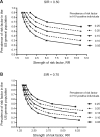Risk of Breast, Prostate, and Colorectal Cancer Diagnoses Among HIV-Infected Individuals in the United States
- PMID: 29529223
- PMCID: PMC6136931
- DOI: 10.1093/jnci/djy010
Risk of Breast, Prostate, and Colorectal Cancer Diagnoses Among HIV-Infected Individuals in the United States
Abstract
Background: Although people living with HIV or AIDS (PLWHA) are at higher risk for many cancers, breast, prostate, and colorectal cancer rates are lower in this patient population. Because these tumors are often screen-detected, these inverse associations could be driven by HIV-related differences in utilization of cancer screening.
Methods: We ascertained incident breast, prostate, and colorectal cancer in PLWHA using data from the HIV/AIDS Cancer Match Study (1996-2012). Comparisons with general population cancer rates were made using standardized incidence ratios (SIRs), overall and stratified by tumor stage/size, breast cancer estrogen receptor status, and colorectal site. We also examined the potential effect of study design and unmeasured confounding on inverse standardized incidence ratios.
Results: Compared with the general population, PLWHA had lower rates of invasive breast (SIR = 0.63, 95% confidence interval [CI] = 0.58 to 0.68), prostate (SIR = 0.48, 95% CI = 0.46 to 0.51), proximal colon (SIR = 0.67, 95% CI = 0.59 to 0.75), distal colon (SIR = 0.51, 95% CI = 0.43 to 0.59), and rectal cancers (SIR = 0.69, 95% CI = 0.61 to 0.77). Reduced risk persisted across tumor stage/size for prostate and colorectal cancers. Although distant-stage breast cancer rates were not reduced (SIR = 0.94, 95% CI = 0.73 to 1.20), HIV-infected women had lower rates of large (>5 cm) breast tumors (SIR = 0.65, 95% CI = 0.50 to 0.83). The magnitude of these inverse standardized incidence ratios could not plausibly be attributed to case underascertainment, out-migration, or unmeasured confounding.
Conclusions: Breast, prostate, and colorectal cancer rates are markedly lower among PLWHA, including rates of distant-stage/large tumors that are not generally screen-detected. This set of inverse HIV-cancer associations is therefore unlikely to be due primarily to differential screening and may instead represent biological relationships requiring future investigation.
Figures


Comment in
-
Opportunities to Understand Unique Cancer Risks in Global HIV-Infected Populations.J Natl Cancer Inst. 2018 Sep 1;110(9):923-924. doi: 10.1093/jnci/djy030. J Natl Cancer Inst. 2018. PMID: 29529221 Free PMC article. No abstract available.
References
Publication types
MeSH terms
Grants and funding
LinkOut - more resources
Full Text Sources
Other Literature Sources
Medical

